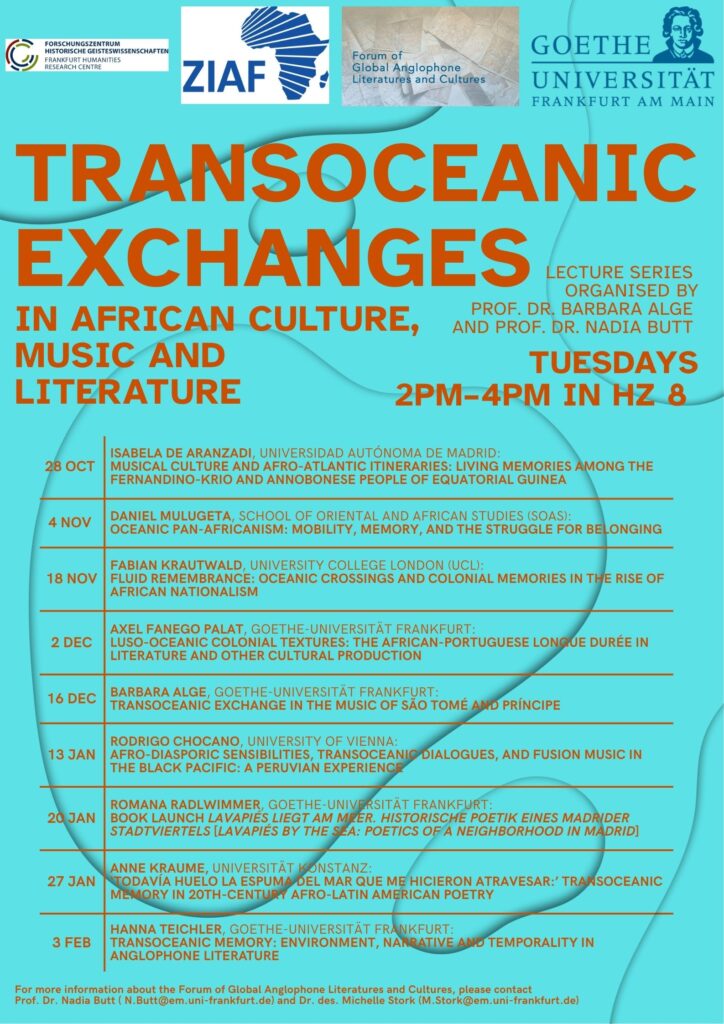Moving Cultures, Transcultural Encounters
Tuesday, 2 December 2025, 2pm-4pm CET
Campus Westend, Hörsaalzentrum, room HZ 8
Co-organised by Prof. Dr. Nadia Butt and Prof. Dr. Barbara Alge, funded by ZIAF.

The lecture series is part of the Forum of Global Anglophone Literatures and Cultures.
Axel Fanego Palat (University of Frankfurt, Germany)
Among the parts of Africa that experienced particularly long-standing colonial influence are Angola, Mozambique, and other territories that were under Portuguese rule for centuries. For much of that period, the transatlantic slave trade shaped the colonial landscape of these regions. However, alongside the violent and enduring deportation of human beings (especially to Brazil), there also emerged complex patterns of human mobility and close cultural ties. The lecture will focus on these developments from a longue durée perspective.
Significant cultural exchange can be traced back to the 16th and 17th centuries in the case of Angola. The archival record for this period is more extensive than for many other parts of the African continent. It has been the subject of considerable scholarly attention, including efforts to reconstruct aspects of everyday life, for example in the city of Luanda (Caldeira 2013). Further important work on this period has been conducted by Beatrix Heintze, formerly of the Frobenius Institute in Frankfurt am Main (see e.g. Heintze 2007). Due to sustained colonial contact and the global circulation of people, the social fabric of Portuguese-speaking regions in Africa developed a particularly rich and entangled character. While mainland Africa has generally not witnessed the formation of what might be termed hybrid or creole communities, some notable exceptions exist in the former Portuguese territories. One segment of the lecture will explore this topic in greater detail.
The 19th century was marked by changing economic conditions, particularly the decline of the slave-based economy. As Portugal’s global influence waned, Brazil increasingly became a key cultural point of reference for Portuguese-speaking territories in Africa. Artistic and intellectual exchanges flourished across the South Atlantic, often marginalising the colonial metropole in Lisbon in these interactions. This period—better documented than earlier epochs of African history—has also found expression in African literary production. The lecture will present notable examples, such as José Eduardo Agualusa’s Nação Crioula (1997), discussing the insights the novel offers into the oceanic world that connected Angola and Mozambique, as well as its relevance to contemporary Luso-African literature and culture.
Retrospective engagements with Portugal’s colonial presence continue to shape cultural production into the 20th and 21st centuries. More than in most other European colonies in Africa, migration between Portugal and its African territories—often in both directions—was a defining feature of the 20th century. Salazar’s Estado Novo regime grounded its colonial project in a unique mix of Luso-Tropicalism and fascist ideology. The struggle for independence was particularly violent in the Portuguese colonies, and it was only in the mid-1970s, following brutal anti-colonial wars, that these countries gained independence. The fraught yet intimate relationship between the former colonies and the metropole continues to inspire artistic, cinematic, and activist engagement. The lecture will conclude by exploring contemporary reflections and the insights they offer.
Bio Note:
Axel Fanego Palat joined Goethe University in 2018 as a professor of African studies after more than ten years in a similar position at the University of Helsinki, Finland. He has conducted language-related research mainly on Bantu languages. He obtained his PhD degree from the University of Cologne in 2000 with a description of Lucazi (Angola, Namibia). His central research interests include linguistic anthropology and sociolinguistics, emphasising long-term historical continuities in the conceptual worlds and the linguistic imprint these leave on cultural communities linked to the African continent.


